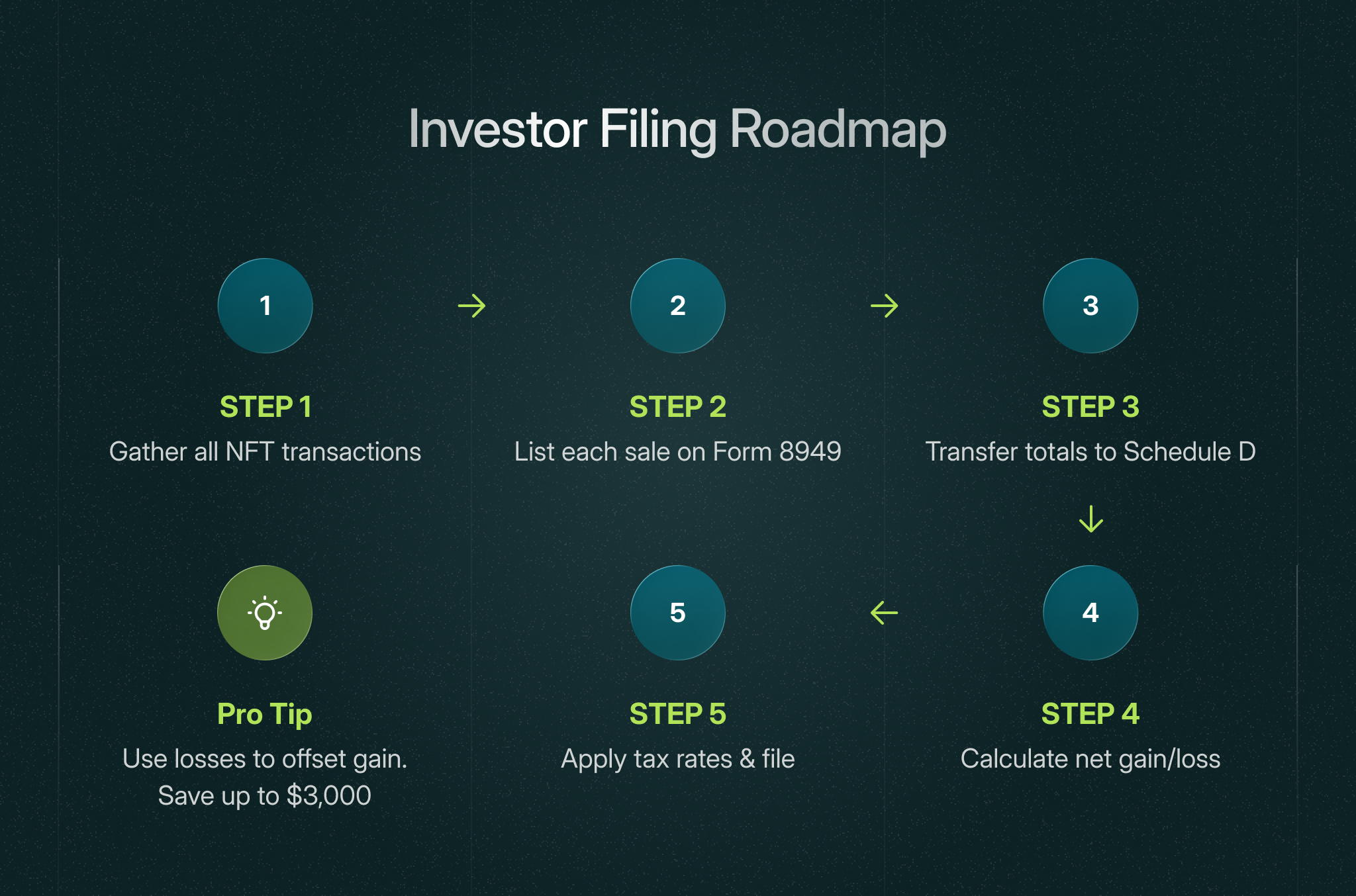NFTs are no longer just digital art or collectibles. In 2025, they’ve become part of finance, gaming, real estate, and even music rights. With this growth comes clearer tax rules, and the IRS now expects both investors and creators to report NFT activity with accuracy.
That’s where confusion starts. Many people don’t know when an NFT sale becomes taxable, or whether royalties are treated differently from sales. Creators worry about whether their work counts as a business or a hobby. Investors often overlook that using crypto to buy an NFT can trigger its own tax event.
The good news is that reporting doesn’t have to be complicated. The IRS rules may look intimidating, but with the right steps, you can stay compliant, lower your tax bill, and avoid problems later.
This guide will walk you through the essentials:
-
How NFTs are taxed in 2025
-
Which tax forms apply to investors and creators
-
What counts as a taxable event
-
Strategies that help reduce liability
Whether you’re minting your first collection, collecting for the long term, or flipping NFTs for profit, the rules are the same: track your transactions, report them correctly, and know where you can save.
At Count On Sheep, our goal is simple — to make crypto tax clear, not stressful.
Why NFT Taxes Matter in 2025
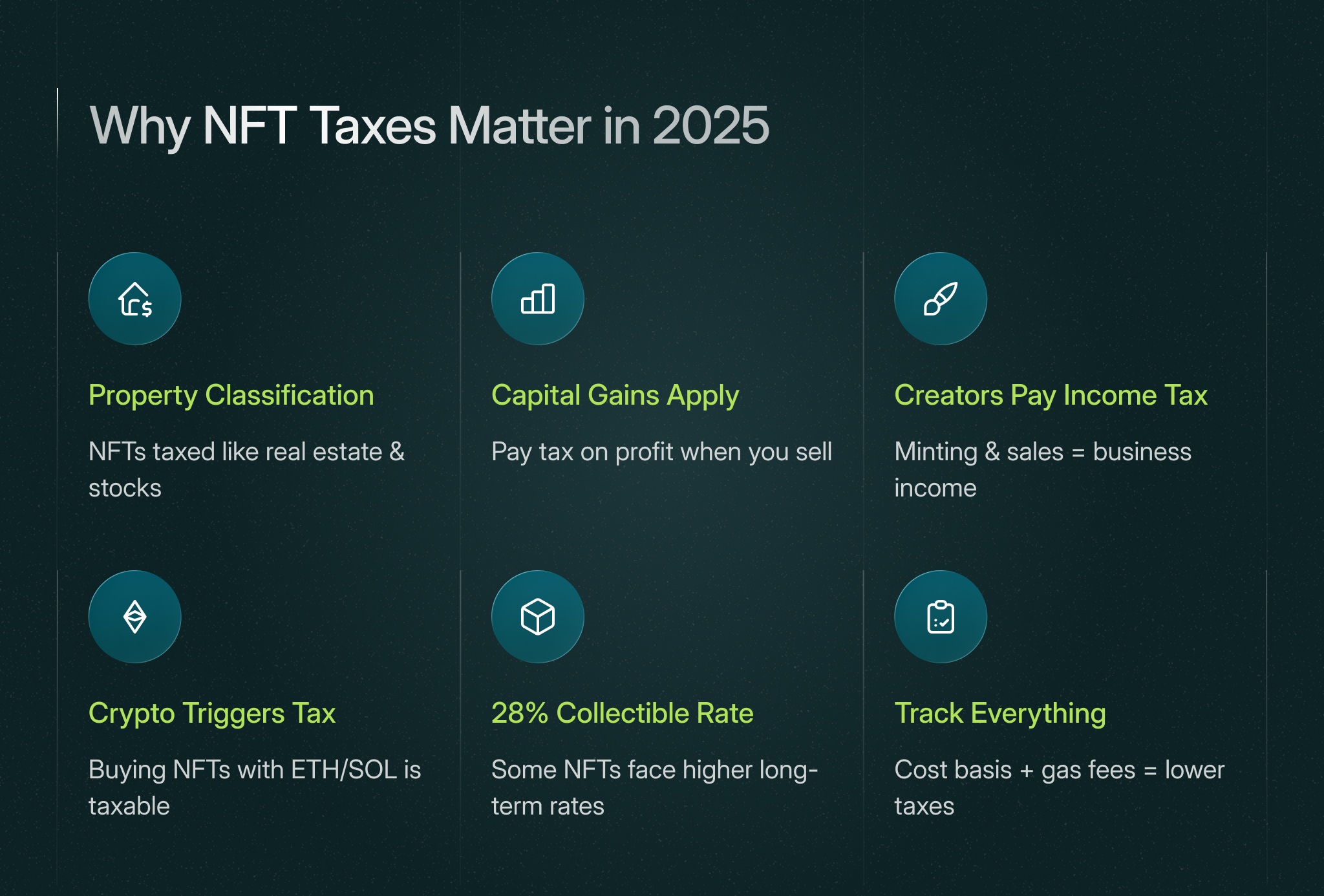
The IRS now classifies NFTs as digital assets, which means the same tax rules that apply to crypto also apply to NFT transactions. Every move you make — buying, selling, minting, or earning royalties — can create a taxable event.
Here’s what that looks like in practice:
-
Buying NFTs with crypto – Using Ethereum, Solana, or another token to buy an NFT is not tax-free. You first trigger a taxable event on the crypto you spend if it’s worth more than when you acquired it.
-
Selling NFTs – Whether you sell for fiat currency or trade into another crypto, you owe capital gains tax based on the difference between your cost basis and the sale price.
-
Earning royalties – Ongoing royalties from secondary sales are considered ordinary income. If you’re a professional creator, this also means potential self-employment tax.
-
Minting NFTs – If minting costs money (gas fees, marketplace charges), those costs affect your taxable income.
Why does this matter? Because failing to report these correctly can create problems down the road:
-
The IRS is increasing audits around digital asset transactions.
-
Incorrect reporting can mean penalties, interest, and unexpected tax bills.
-
Unreported NFT income could flag mismatches if exchanges or marketplaces issue tax forms like Form 1099-DA.

For investors, proper reporting helps you manage capital gains and losses. Losses from NFT sales can be used to offset gains from other assets, lowering your overall taxable income.
For creators, accurate filing ensures you don’t overpay. If you treat NFT activity as a business, you can deduct expenses like gas fees, platform costs, and even professional services. But if you fail to classify correctly, you could miss out on valuable tax benefits.
In short: reporting NFT taxes in 2025 is about more than compliance. It’s about making sure your transactions are recorded the right way, your tax liability is reduced where possible, and you avoid surprises when it’s time to file.
Step 1: Understand How NFTs Are Taxed
The IRS applies the same tax rules for NFTs as it does for cryptocurrency and other capital assets. But there are unique points for NFT investors and creators.
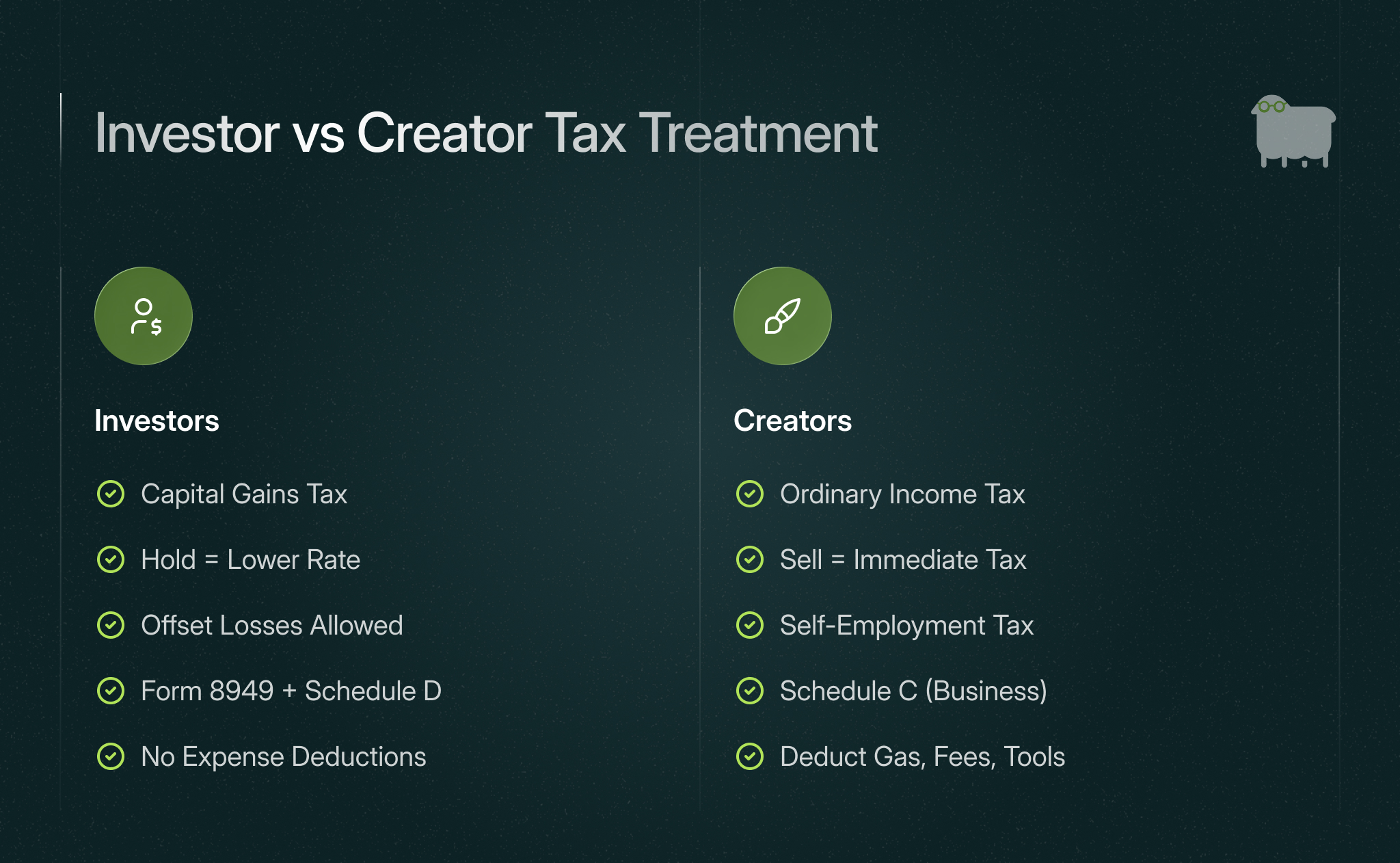
For Investors
-
Capital gains tax applies. If you sell an NFT for more than its cost basis, you owe capital gains tax.
-
Short-term vs long-term. Hold less than a year = short-term gains taxed at your ordinary income rate. Hold more than a year = long-term capital gains, usually lower, unless the NFT is treated as a collectible.
-
Losses matter too. Losses from NFT sales can offset other gains. Up to $3,000 in excess losses can offset ordinary income each year.
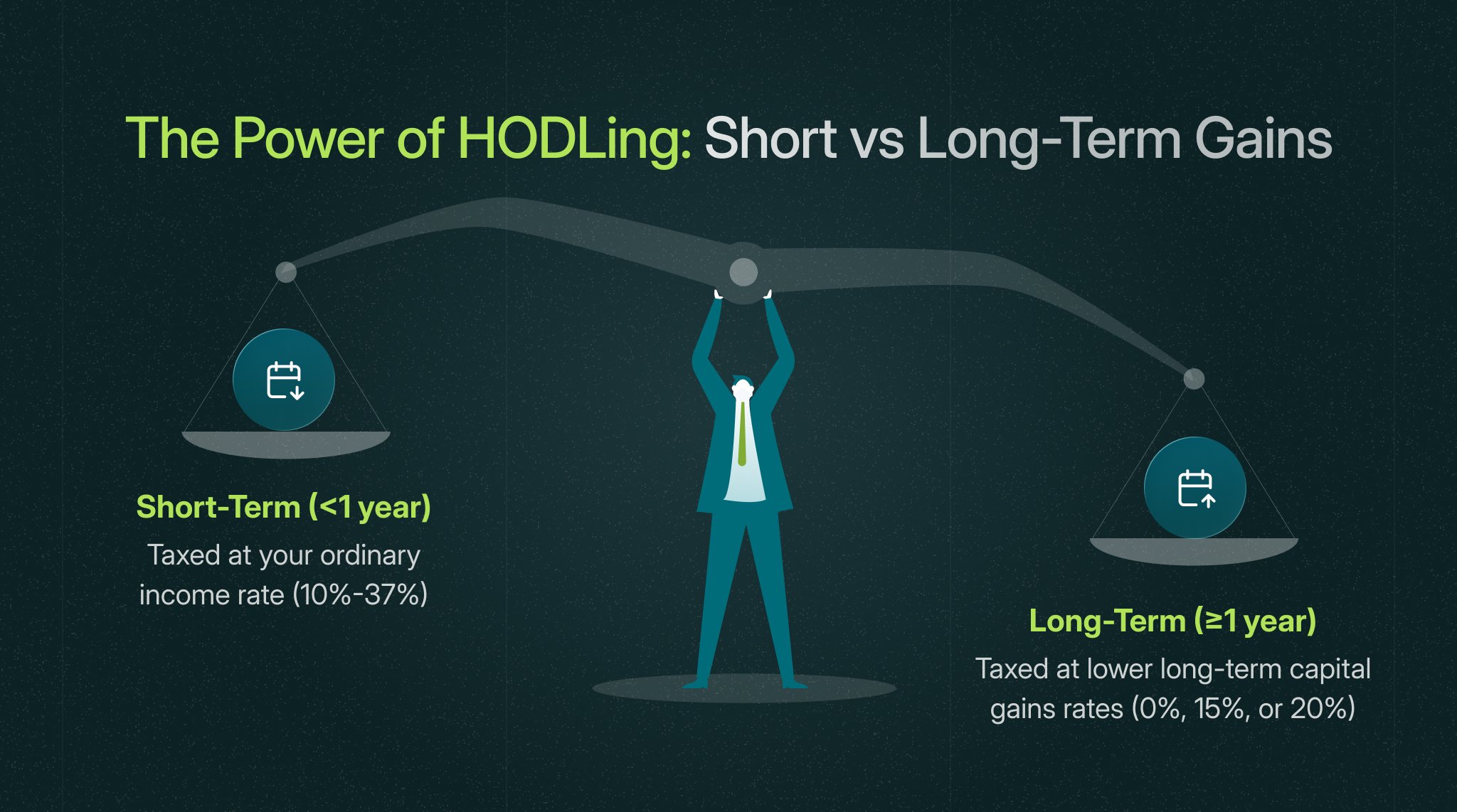
For Creators
-
NFT sales = income. Revenue from minting or selling NFTs is considered ordinary income.
-
Professional vs hobby. Professionals report on Schedule C and pay self-employment tax. Hobbyists use Schedule 1 and can’t deduct expenses.
-
Royalties. Ongoing royalty income is taxable and may also be subject to self-employment tax.
Step 2: Identify Taxable Events
A taxable event happens whenever you make or dispose of an NFT or crypto asset. Common taxable events in 2025 include:
-
Selling NFTs for crypto or fiat currency.
-
Buying NFTs with crypto, since using crypto itself is taxable.
-
Swapping NFTs or trading one NFT for another.
-
Minting NFTs if there are gas fees or if the creation is part of your business.
-
Receiving royalties from secondary sales.
If you’re asking: “Do I owe taxes for this NFT transaction?” — the answer is probably yes.
Step 3: Track Cost Basis and Fair Market Value
Accurate records are key for NFT tax reporting.
-
Cost basis: The amount you originally paid, including gas fees and transaction costs.
-
Fair market value (FMV): The value of the NFT or crypto at the time of purchase or sale.
When you sell, the gain or loss = FMV at sale – cost basis.
Example: You buy an NFT for 1 ETH when ETH is $2,000. You sell it later for 1.5 ETH when ETH is $2,500.
-
Cost basis = $2,000.
-
Sale value = $3,750.
-
Capital gain = $1,750.
Tracking this across multiple NFT transactions is why many crypto investors use crypto tax software.
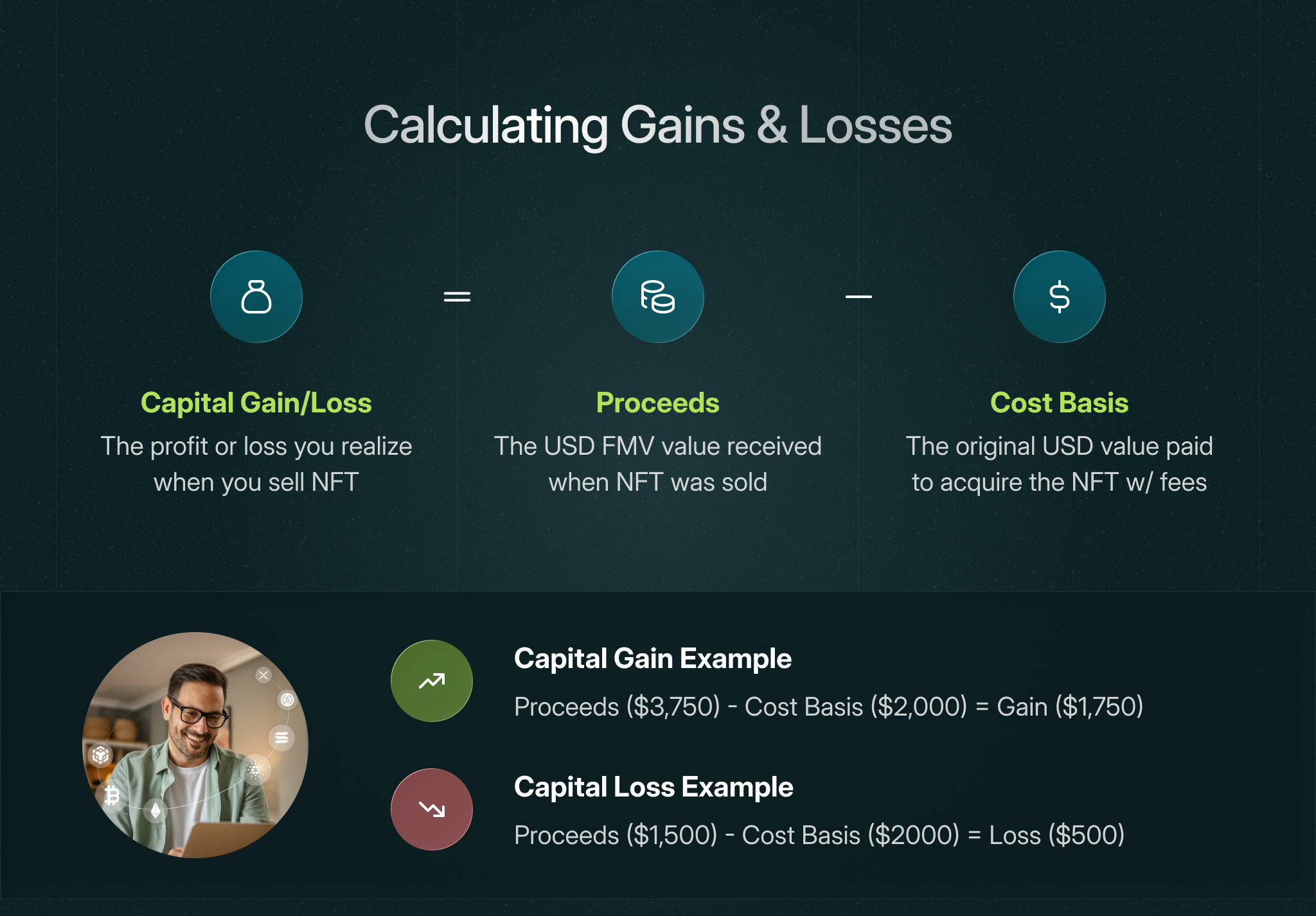
Step 4: Know Which IRS Forms to Use
NFT taxes are reported with standard crypto and property tax forms. Here’s what you’ll likely use in 2025:
-
Form 8949: Report each NFT sale or trade.
-
Schedule D: Summarize all capital gains and losses.
-
Schedule C: If you’re a professional NFT creator, report business income and expenses.
-
Schedule 1: For hobby creators, report NFT income (no deductions allowed).
-
Form 1099-DA: Starting in 2025, exchanges and marketplaces will send this form for digital asset transactions, including NFT sales.
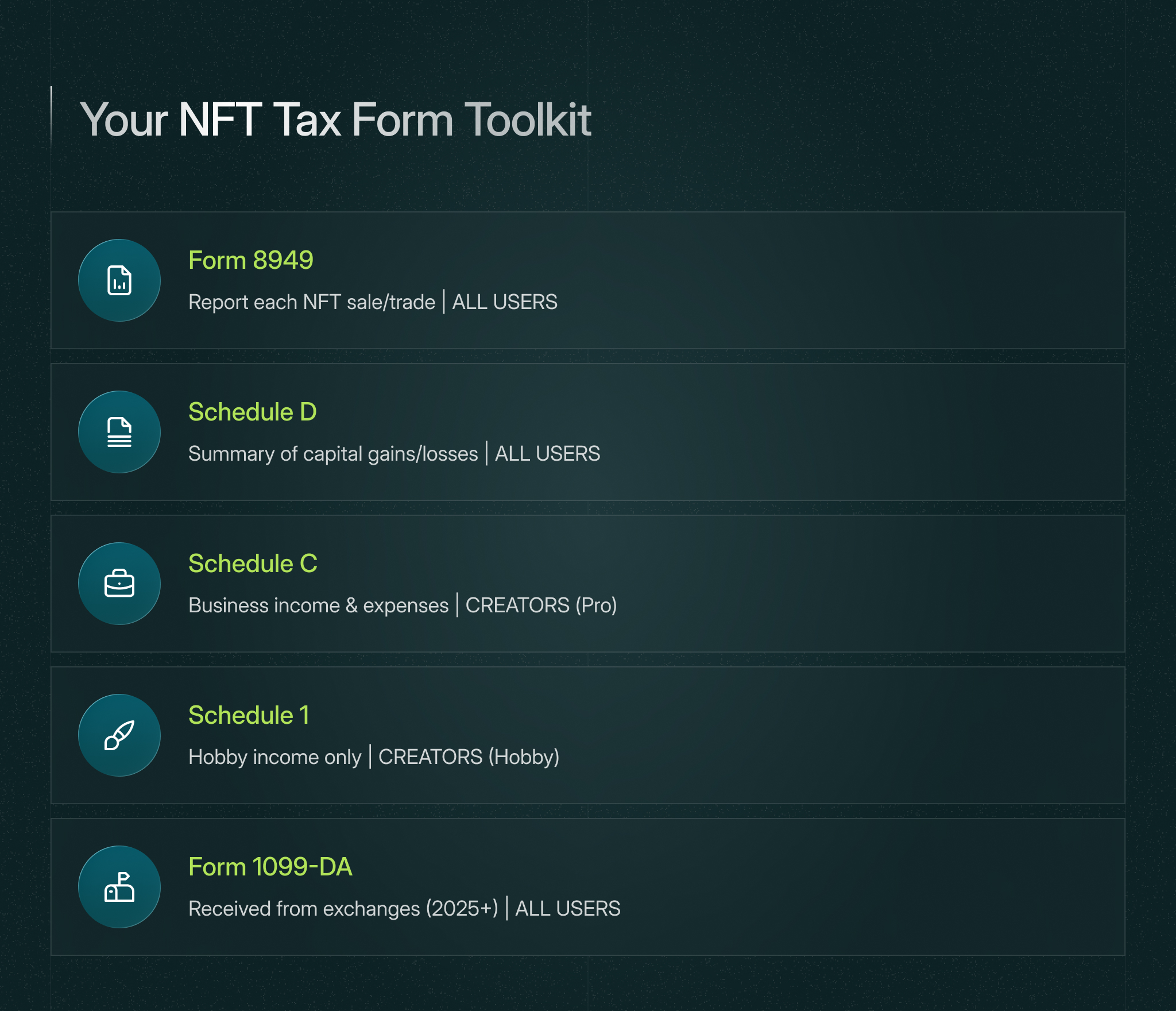
Step 5: File as an Investor
If you’re an investor:
-
List every NFT transaction on Form 8949.
-
Transfer totals to Schedule D.
-
Report net gains or losses.
-
Apply short-term or long-term tax rates.
Pro tip: Losses can offset other gains. If you have more losses than gains, you can reduce ordinary income by up to $3,000.
Step 6: File as a Creator
If you create NFTs for profit:
-
Income is considered ordinary income.
-
Report sales and royalties on Schedule C.
-
Deduct business expenses like software, marketing, and gas fees.
-
Pay income tax plus self-employment tax.
If creating NFTs is a hobby, report income on Schedule 1. No expense deductions allowed.
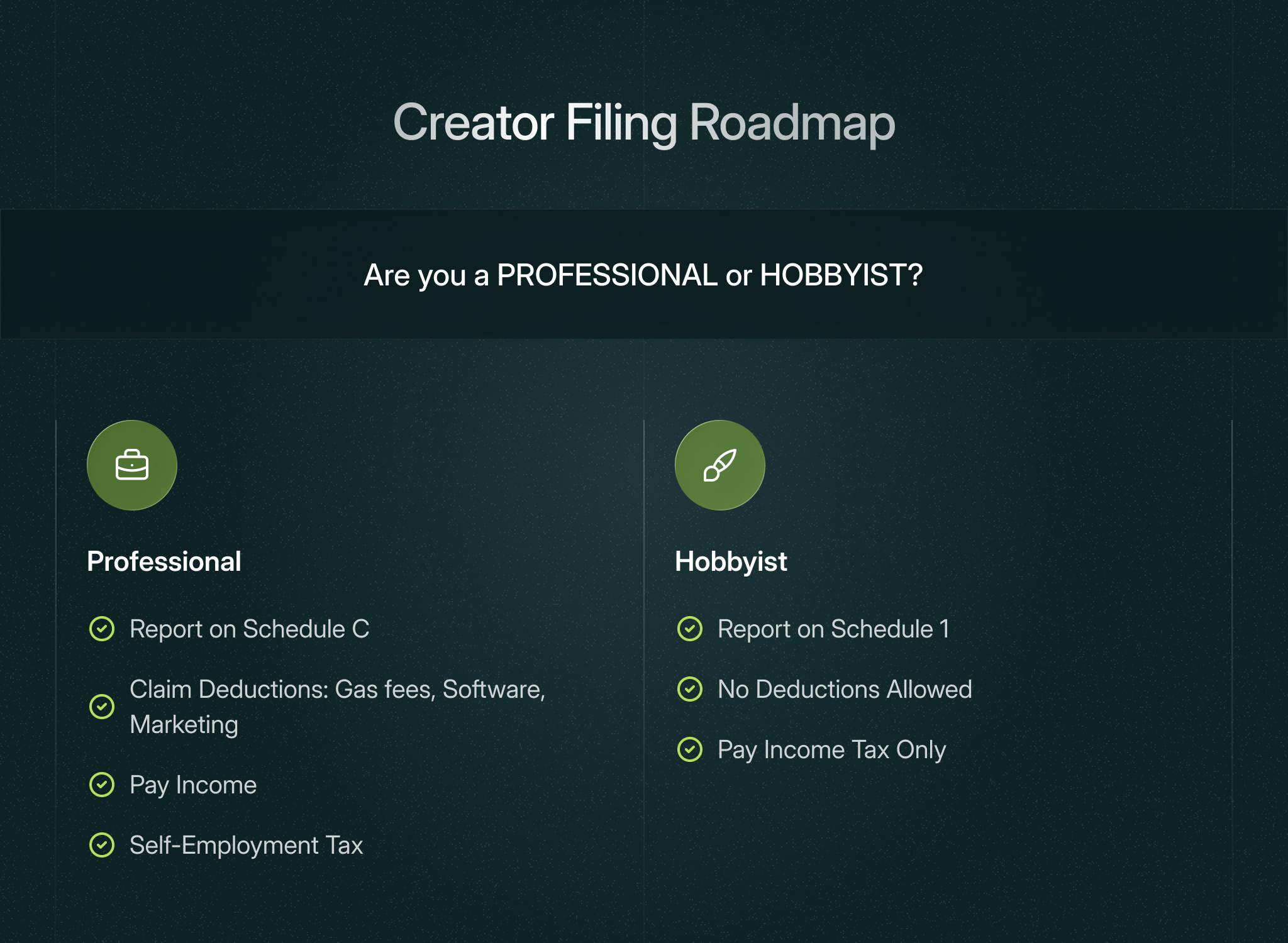
Step 7: Use Crypto Tax Software
Manually tracking NFT transactions can get overwhelming. That’s why most NFT investors and creators use crypto tax software.
Features to look for:
-
Automatic import of NFT transactions from multiple wallets and exchanges.
-
Support for DeFi and NFT sales.
-
Cost basis tracking, including gas fees.
-
Automated tax form generation.
-
Tax-loss harvesting tools.
-
Export to TurboTax or H&R Block.
Some top platforms in 2025 include: Koinly, CoinLedger, ZenLedger, and TokenTax. Most offer free plans with limits, and paid plans for high-volume NFT traders.
Step 8: Reduce Your NFT Tax Bill
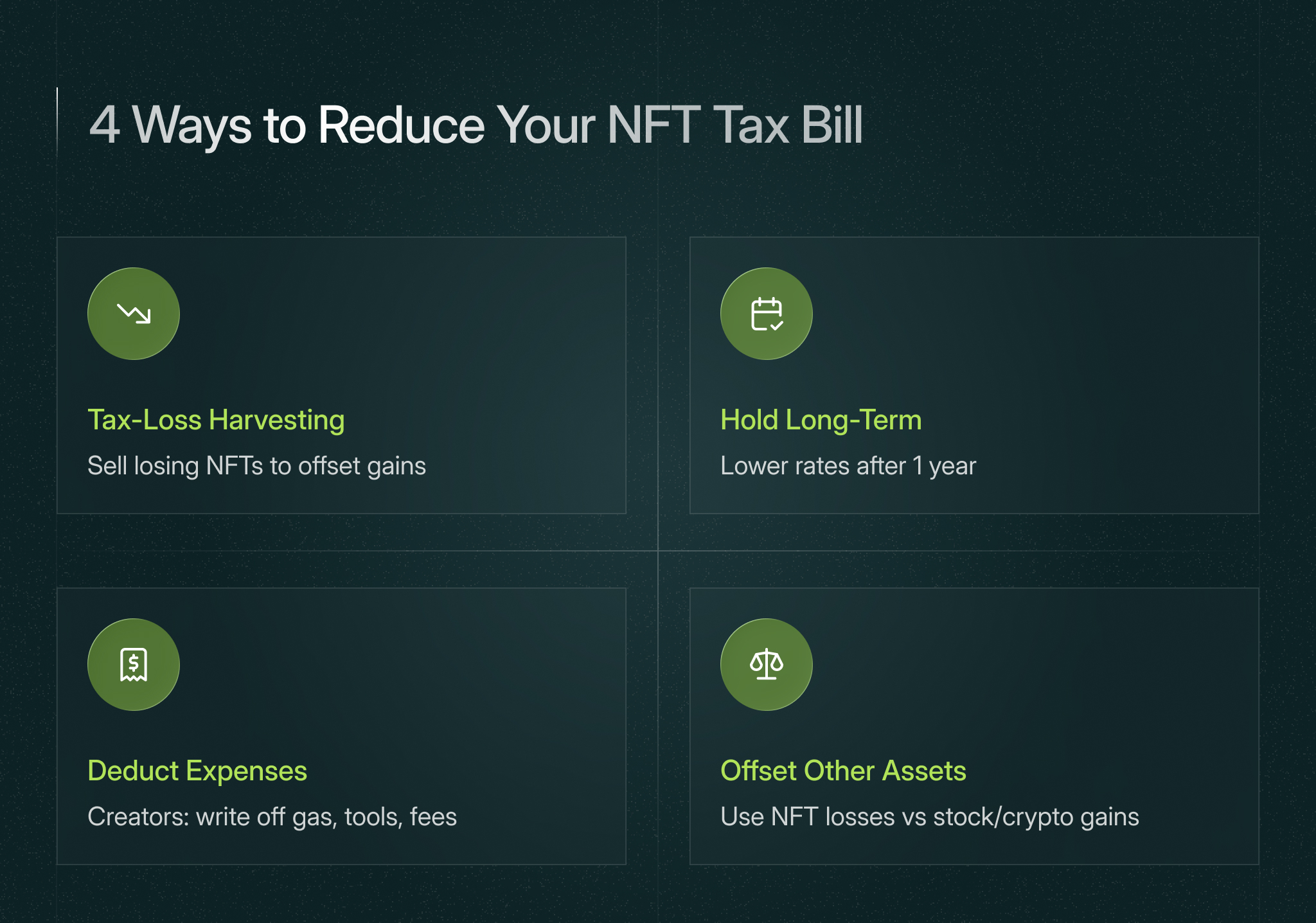
You can’t avoid paying taxes, but you can reduce them legally with good tax strategy:
-
Tax-loss harvesting: Sell losing NFTs to offset other gains.
-
Hold long-term: Long-term capital gains rates are usually lower.
-
Deduct expenses: Creators can deduct gas fees, software, and marketing costs.
-
Offset with other capital assets: Losses from NFTs can offset gains from stocks, crypto, or other property.
Common Mistakes to Avoid
NFT taxes are still new for many people, which makes mistakes easy. The Internal Revenue Service (IRS) isn’t forgiving when it comes to digital assets, so understanding where others slip up can save you stress — and money.
Here are the most common mistakes we see:
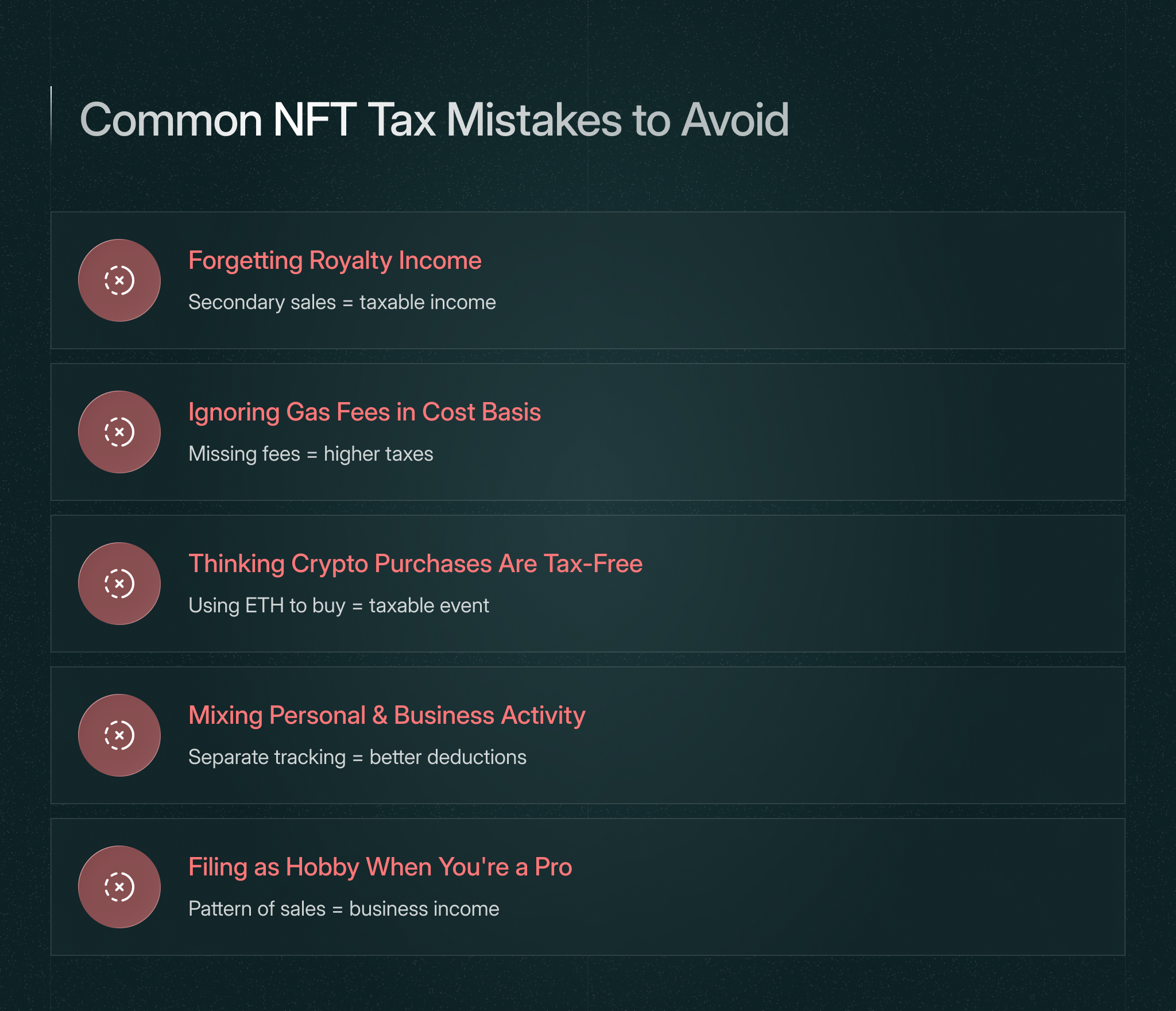
1. Forgetting to Report NFT Royalties
Many creators earn ongoing royalties from secondary NFT sales. These payments are not “extra perks” — they’re taxable income. If you’re a professional creator, you must report NFT income and expenses on Schedule C. That means royalty income may be treated as self-employment income, subject to both ordinary income tax and self-employment tax. Hobby creators, on the other hand, report their income on Schedule 1 of Form 1040, but they can’t deduct expenses. Skipping royalty income often leads to mismatches on Form 1099 or the new 1099-DA, which can raise compliance issues.
2. Not Tracking Cost Basis or Gas Fees
Your cost basis determines your gain or loss. Forgetting to include marketplace fees, minting costs, or gas fees means you could end up overstating capital gains. Since capital gains tax is calculated by subtracting cost basis from the fair market value at sale, missing fees inflates your taxable income. Professional creators can deduct these expenses as part of their business income, but hobbyists can’t. Not tracking them accurately can increase your overall tax liability.
3. Assuming Buying with Crypto Isn’t a Taxable Event
A common misconception is that buying an NFT with ETH or SOL is tax-free. In reality, using cryptocurrency to purchase an NFT triggers a taxable event. You need to calculate the gain or loss on the crypto you spent, based on its fair market value at the time of disposal compared to your cost basis. If you ignore this step, your transaction history will be incomplete, and you may end up owing back taxes. The IRS considers every crypto-to-NFT purchase part of your digital asset transactions, and that means potential capital gains and losses.
4. Mixing Personal and Business NFT Activity
Some NFT investors casually sell art, while others run full-time NFT businesses. If you sell NFTs as a hobby, you can’t take a tax deduction for expenses, but professionals can. Mixing the two creates confusion, especially when filing your tax return. For professionals, NFT activity is considered ordinary income and reported on Schedule C, allowing deductions for things like crypto tax software, transaction fees, and portfolio tracking platforms. Keeping activity separate ensures accurate crypto tax reporting and avoids IRS disputes over your overall taxable income.
5. Filing as a Hobbyist When You Qualify as a Professional
Many creators underreport because they assume they’re “just experimenting” with NFTs. But if your sales, royalties, or digital asset proceeds show a pattern of business, the IRS may treat it as professional activity. Professionals must report on Schedule C, while hobbyists file under Schedule 1 without expense deductions. Filing incorrectly can mean paying more income tax than you owe — or worse, failing to meet your tax obligations.
Count On Sheep Can Help
Don’t lose sleep over NFT taxes. At Count On Sheep, we simplify reporting for investors and creators.
-
We track your NFT transactions, cost basis, and fair market value.
-
We prepare IRS-ready forms like Form 8949, Schedule D, and 1099-DA.
-
We help creators handle self-employment tax and deductions.
-
We build tax strategies to save you money while keeping you compliant.
Stay compliant. Save more. Sleep easy.
Talk to a crypto tax specialist today.
FAQs
1. Do I pay taxes on NFT gifts?
Yes. Gifting an NFT can trigger a taxable event for the giver. The recipient may owe capital gains tax when they sell. Keep records of fair market value at the time of gifting.
2. Are NFTs taxed differently from crypto?
The IRS treats both NFTs and cryptocurrency as property. NFTs tied to collectibles may face a 28% long-term capital gains rate, while others follow standard capital gains rules.
3. Do I need to report NFTs bought with crypto?
Yes. Using crypto to buy an NFT triggers a taxable event for the crypto spent. Report the gain or loss based on the crypto’s cost basis and fair market value.
4. What happens if I don’t report NFT income?
Failing to report NFT income can lead to IRS penalties, back taxes, and potential audits. Both professional and hobby creators must file accurately on the correct tax forms.
5. Can NFT losses reduce my taxes?
Yes. NFT losses can offset other capital gains, and up to $3,000 of excess losses can reduce ordinary income per year. Proper crypto tax reporting ensures you maximize this tax benefit.
6. How are NFT royalties taxed?
Royalties are considered ordinary income and may be subject to self-employment tax if the creator operates professionally. Record all royalty payments for accurate tax reporting.
7. Do I need to track minting costs and gas fees?
Yes. Gas fees and minting costs count toward your cost basis. Accurate tracking lowers capital gains tax and supports correct tax form preparation.
8. Which IRS forms do I use for NFT taxes?
Use Form 8949 to report capital gains and losses and Schedule D for netting gains and losses. Professional creators also use Schedule C for NFT income and expenses.
Tags:
NFTs
October 14, 2025
